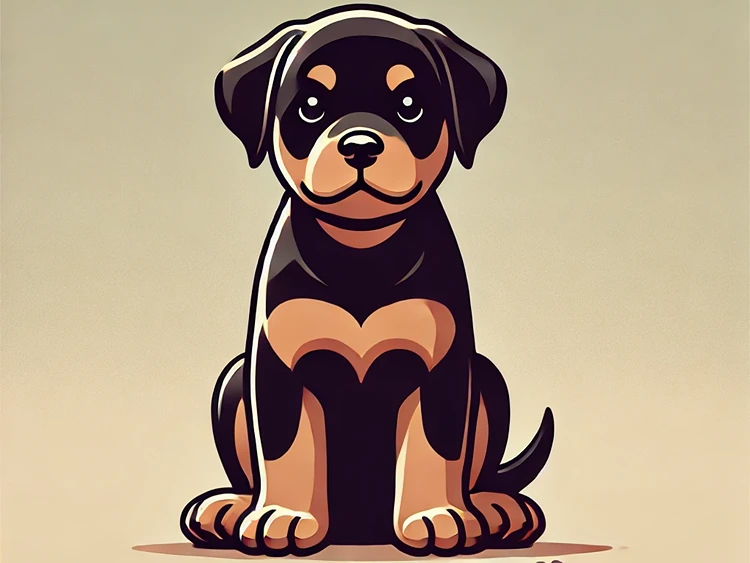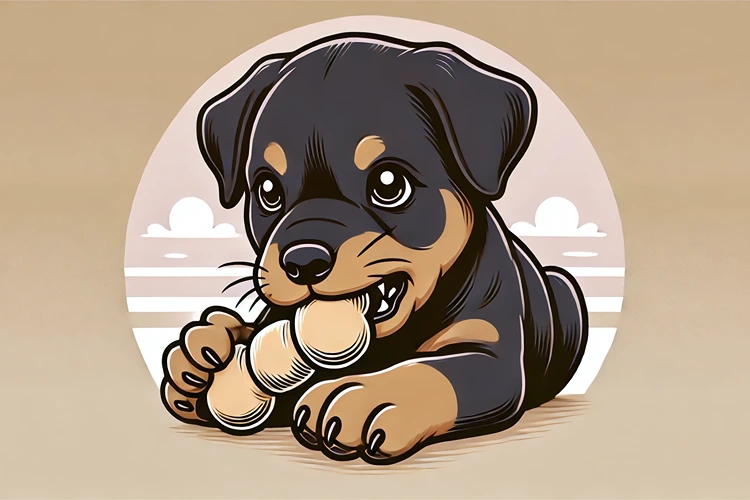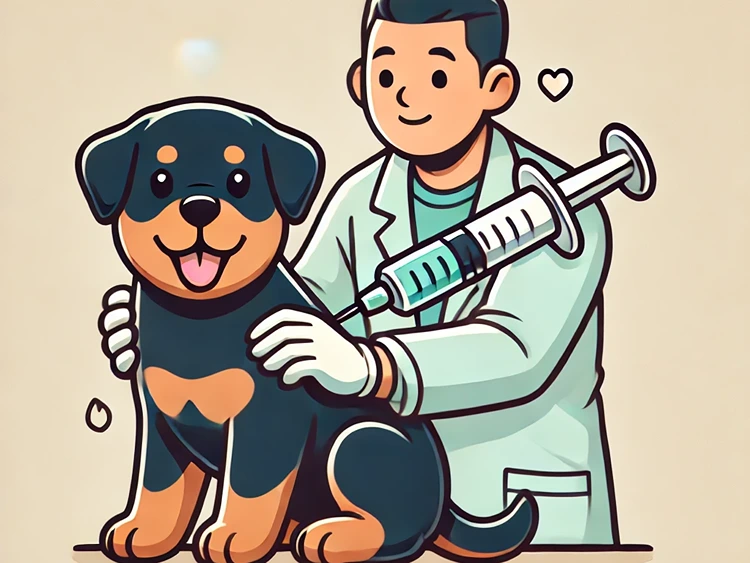Rottweiler puppies grow quickly during their first year, transitioning through various stages that shape their physical and behavioral development. Understanding these growth stages is crucial for any Rottweiler owner, as it helps you anticipate your pup’s needs, address any concerns, and ensure their healthy development. From the adorable, wobbly steps of a newborn to the strong, confident strides of a young adult, this journey is both exciting and demanding. Let’s explore the key growth stages of Rottweiler puppies during their first year.
Newborn to 2 Weeks: The Neonatal Stage
During the neonatal stage, Rottweiler puppies are entirely dependent on their mother. They are born blind, deaf, and toothless, relying on their sense of touch and smell to find warmth and nourishment. At this stage, puppies spend most of their time sleeping and nursing, crucial activities that support rapid growth and brain development.
Rottweiler puppies typically weigh between 1 to 2 pounds at birth. Their primary focus is on growing and developing essential bodily functions. The mother plays a vital role in stimulating their bodily functions through licking, which helps the puppies relieve themselves and encourages proper digestion.
How to Support Your Rottweiler Puppy During the Neonatal Stage
At this stage, it’s essential to provide a warm, quiet environment for the mother and her puppies. Limit handling to avoid causing stress, and ensure that the mother has plenty of food and water to support milk production. Regularly check the puppies’ weight to ensure they are gaining adequately, as this is a critical indicator of their health during the neonatal stage.
Paw-some Tip:
Ensure the whelping area is clean and warm, ideally between 85-90°F. Maintaining the right temperature is crucial, as newborn puppies cannot regulate their body temperature. Use a heating pad or lamp, but ensure there’s a cooler area so the puppies can move away if they get too warm.
2 to 4 Weeks: The Transitional Stage
Rottweiler puppies begin to open their eyes and ears during the transitional stage, allowing them to explore their surroundings more actively. This stage marks the beginning of significant behavioral changes, as puppies start to interact with their littermates and respond to sounds and movements around them.
By the end of this period, Rottweiler puppies typically start walking, albeit unsteadily, and their teeth begin to emerge. Their sense of sight and hearing sharpens, and they start to recognize their mother and littermates. The weaning process also begins, with puppies gradually transitioning from their mother’s milk to solid food.
What to Expect During the Transitional Stage
During this time, it’s important to introduce the puppies to different sights, sounds, and textures to encourage healthy sensory development. Gentle handling is encouraged to help them get accustomed to human touch, which is essential for socialization. Additionally, ensure that the puppies start receiving small amounts of puppy food alongside their mother’s milk to aid the weaning process.
Why Socialization Matters at This Stage
Socialization is crucial during the transitional stage as it lays the foundation for a well-adjusted adult dog. Exposing the puppies to a variety of experiences helps them become confident and adaptable. At this point, introducing them to different sounds, such as vacuum cleaners or the doorbell, can prevent fear of these noises later in life.
4 to 8 Weeks: The Socialization Stage
The socialization stage is one of the most critical periods in a Rottweiler puppy’s development. During these weeks, puppies learn important social skills by interacting with their littermates, mother, and humans. They become more curious and start to explore their environment more actively. This stage is also when they begin to develop their personalities.
Rottweiler puppies start to display more playful behavior, such as wrestling with littermates and playing with toys. This play is crucial for learning bite inhibition and other social cues. The mother continues to wean the puppies off milk, and by the end of this stage, they should be fully transitioned to solid food.
How to Encourage Positive Socialization
Positive socialization during this stage is key to raising a well-behaved Rottweiler. Introduce your puppy to a variety of people, including children and adults, as well as other pets. Ensure these interactions are positive to build your puppy’s confidence and reduce the risk of fearfulness or aggression later in life.
Rottie Stats:
A study found that puppies exposed to different stimuli during the socialization stage are less likely to develop behavioral issues such as aggression and anxiety. Early socialization is key to raising a balanced Rottweiler.
Potty Training and Basic Commands
This stage is also a great time to start basic potty training and introduce simple commands like “sit” and “stay.” Keep training sessions short and positive, using treats and praise to encourage good behavior. Rottweilers are intelligent and respond well to positive reinforcement, so this is the ideal time to start laying the groundwork for future training.
Paw-some Tip:
Use a designated potty area and consistently take your puppy there after meals, playtime, and naps. Praise them immediately after they eliminate in the right spot. Patience and consistency are key to successful potty training during the socialization stage.
8 to 16 Weeks: The Juvenile Stage
The juvenile stage is often referred to as the “terrible twos” of puppyhood. Rottweiler puppies become more independent and may start testing boundaries. This is a critical time for training, as habits formed during this period can last a lifetime. The juvenile stage also marks the beginning of the teething phase, which can be challenging for both the puppy and the owner.
During this stage, Rottweilers grow rapidly, and their energy levels increase. They are more playful and may begin to show their protective instincts. Socialization remains important, but this is also the time to focus on consistent training and setting clear boundaries.
Managing Teething and Nipping
Teething can be uncomfortable for puppies, leading to increased chewing and nipping behaviors. Provide plenty of appropriate chew toys to soothe their gums and redirect their chewing away from furniture and fingers. Consistency in training is crucial; if your puppy nips, firmly say “no” and offer a chew toy instead.
Establishing Routines and Training
Routines become increasingly important during the juvenile stage. Establishing a consistent feeding, potty, and training schedule helps your Rottweiler puppy understand expectations and reduces the likelihood of behavioral issues. Training sessions should remain positive and short to keep your puppy engaged.
Paw-some Tip:
To help with teething discomfort, try freezing a wet washcloth and offering it to your puppy. The cold texture can soothe sore gums and provide some relief during this challenging phase.
16 to 24 Weeks: The Adolescent Stage
Rottweiler puppies enter adolescence between 16 to 24 weeks, a period marked by significant physical and behavioral changes. They may become more stubborn and independent, making training a bit more challenging. However, this is also a crucial time to reinforce commands and continue socialization.
During adolescence, Rottweilers experience rapid growth spurts, and their bodies start to take on the more muscular build typical of the breed. Their protective instincts may also become more pronounced, making it essential to maintain socialization with people and other animals.
Reinforcing Training and Socialization
Consistency is key during the adolescent stage. Rottweilers may test boundaries, so it’s important to reinforce training and ensure that they understand their role in the household. Continue exposing your puppy to new experiences, environments, and people to maintain their social skills.
Exercise and Mental Stimulation
Rottweilers are an active breed, and their exercise needs increase during adolescence. Regular physical activity, combined with mental stimulation through training and puzzle toys, helps channel their energy positively and prevent boredom-related behaviors.
Rottie Stats:
Rottweilers can grow rapidly during adolescence, with some puppies gaining up to 5 pounds per week. Adequate exercise and a balanced diet are crucial to support healthy development.
24 Weeks to 6 Months: The Late Adolescent Stage
As your Rottweiler puppy moves into the late adolescent stage, their physical and behavioral traits become more pronounced. By this age, they have developed a strong bond with their family and are likely showing the protective nature that Rottweilers are known for. However, they may also continue testing limits, making consistent training and clear boundaries essential.
During this stage, Rottweilers continue to grow rapidly, and their muscles start to fill out. They may begin to exhibit more territorial behaviors, such as barking at strangers or other animals. This stage is critical for reinforcing training and ensuring your Rottweiler understands acceptable behavior.
Addressing Behavioral Challenges
It’s common for Rottweiler puppies to push boundaries during late adolescence. They may become more stubborn or assertive, challenging your authority as they explore their independence. This is why it’s important to maintain a consistent training routine, using positive reinforcement to encourage good behavior.
If your Rottweiler starts showing signs of aggression or excessive guarding, it’s essential to address these behaviors immediately. Socialization should continue to be a priority, exposing your puppy to a variety of people, animals, and environments to help them remain well-adjusted and confident.
The Importance of Physical Activity
Rottweilers have high energy levels, and by this stage, they need regular exercise to stay healthy and happy. Aim for at least an hour of physical activity each day, which can include walks, playtime, and training sessions. This not only helps manage their energy but also strengthens the bond between you and your puppy.
Paw-some Tip:
Incorporate obedience training into your Rottweiler’s daily exercise routine. For example, practice commands like “sit,” “stay,” and “come” during walks or play sessions. This keeps their mind engaged and reinforces good behavior.
6 to 9 Months: The Early Adult Stage
By 6 to 9 months, your Rottweiler puppy begins transitioning into early adulthood. Their growth starts to slow down, but they continue to fill out and develop muscle mass. At this stage, Rottweilers typically start to settle into their adult personalities, and their energy levels may become more manageable.
However, this is also a time when they may exhibit more dominant behaviors, especially if they sense any inconsistencies in their training. It’s essential to maintain a firm yet positive approach, ensuring that your Rottweiler understands their place in the family hierarchy.
Maintaining Consistent Training
Training should continue to be a part of your Rottweiler’s daily routine. By now, your puppy should have a solid understanding of basic commands, but it’s important to continue practicing and reinforcing these commands regularly. Consistency is key, as any lapses in training can lead to behavioral issues later on.
This is also a good time to introduce more advanced training or activities that challenge your Rottweiler mentally and physically, such as agility training or advanced obedience classes. These activities help keep your Rottweiler engaged and provide an outlet for their energy.
Understanding Adult Rottweiler Behavior
As your Rottweiler approaches adulthood, you may notice changes in their behavior. They may become more protective or territorial, which is natural for the breed. However, it’s important to ensure that these behaviors do not become problematic. Socialization and training should continue to be a focus, helping your Rottweiler to remain a well-rounded and well-behaved companion.
9 to 12 Months: The Final Stage of Puppyhood
As your Rottweiler puppy approaches their first birthday, they begin to settle into their adult size and personality. By this stage, they are likely close to their full adult weight and height, though they may continue to fill out for another year or so. Their behavior should also start to stabilize, with less of the testing behaviors seen during earlier stages.
This final stage of puppyhood is a time to solidify all the training and socialization efforts you’ve put in over the past year. Your Rottweiler should now be a well-behaved, confident, and well-adjusted young adult.
Growth Milestones for Rottweiler Puppies
| Age | Weight Range | Key Developmental Milestones |
|---|---|---|
| 0-2 Weeks | 1-2 lbs | Dependent on mother; senses of touch and smell develop |
| 2-4 Weeks | 2-5 lbs | Eyes and ears open; begins to walk and explore surroundings |
| 4-8 Weeks | 5-15 lbs | Socialization with littermates; weaning begins |
| 8-16 Weeks | 15-30 lbs | Teething; basic training starts; increased independence |
| 16-24 Weeks | 30-50 lbs | Rapid growth; adolescence begins; protective instincts emerge |
| 6-12 Months | 50-100 lbs | Transition to adulthood; muscle development; training reinforcement |
Preparing for Adulthood
As your Rottweiler puppy transitions into adulthood, it’s important to continue providing structure and guidance. Ensure that they have plenty of physical and mental stimulation, as this helps prevent boredom and destructive behaviors. Regular veterinary check-ups are also crucial at this stage to monitor their health and address any issues early on.
If you haven’t already, this is also a good time to spay or neuter your Rottweiler, as they are reaching sexual maturity. Discuss the timing with your veterinarian to ensure the best outcome for your dog’s health and behavior.
Reflecting on Your Rottweiler’s First Year
The first year of a Rottweiler’s life is filled with rapid growth, development, and learning. By understanding the key growth stages and providing the right support at each stage, you can help ensure that your Rottweiler grows into a healthy, happy, and well-behaved adult. Reflect on the journey you’ve taken together, and continue to nurture the strong bond that has developed between you and your Rottweiler.
Rottie Stats:
By their first birthday, Rottweilers typically weigh between 80 to 120 pounds, depending on their genetics and sex. Monitoring their growth and maintaining a balanced diet is crucial during this time to prevent obesity and ensure healthy development.
FAQs
Wrapping Up
Understanding the key growth stages of Rottweiler puppies during their first year is crucial for raising a well-adjusted and healthy dog. From the neonatal stage through to young adulthood, each phase presents unique challenges and opportunities for bonding and training. By staying informed and proactive, you can ensure your Rottweiler develops into a confident and loyal companion. Remember, patience and consistency in training, coupled with early socialization, are key to fostering a well-behaved adult Rottweiler. Keep supporting your Rottweiler’s growth with proper care, and you’ll be rewarded with a lifelong friend.




